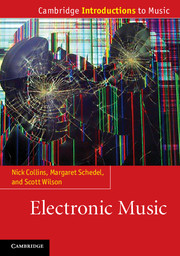Book contents
- Frontmatter
- Contents
- List of illustrations
- List of Tables
- Acknowledgments
- Chapter 1 Introduction
- Chapter 2 Recording technologies and music
- Chapter 3 New sounds and new instruments: Electronic music up until 1948
- Chapter 4 The post-war sonic boom
- Chapter 5 From analog to digital
- Chapter 6 Into the mainstream
- Chapter 7 Synth pop
- Chapter 8 Electronic dance music
- Chapter 9 Continuing the classical?
- Chapter 10 Experimental electronica
- Chapter 11 Sound art
- Chapter 12 Further connections
- Chapter 13 Live electronic music
- Chapter 14 Conclusions
- Notes
- Index
- References
Chapter 7 - Synth pop
Published online by Cambridge University Press: 05 May 2013
- Frontmatter
- Contents
- List of illustrations
- List of Tables
- Acknowledgments
- Chapter 1 Introduction
- Chapter 2 Recording technologies and music
- Chapter 3 New sounds and new instruments: Electronic music up until 1948
- Chapter 4 The post-war sonic boom
- Chapter 5 From analog to digital
- Chapter 6 Into the mainstream
- Chapter 7 Synth pop
- Chapter 8 Electronic dance music
- Chapter 9 Continuing the classical?
- Chapter 10 Experimental electronica
- Chapter 11 Sound art
- Chapter 12 Further connections
- Chapter 13 Live electronic music
- Chapter 14 Conclusions
- Notes
- Index
- References
Summary
At the Eurovision Song Contest in 1980, the synthesizer trio Telex performed Belgium's entry. They appeared, swaying, in dapper scarves, in front of a large unplugged modular synthesizer, and sang a deliberately inane tune, appropriately entitled “Euro-vision.” Typical of the humor of the band, they were aiming for last place and zero points, but were in turn ironically scuppered by Portugal's award of ten points and were dragged into third from last.
Kraftwerk, the rather more famous German synthesizer band, who pioneered the all-synthesizer ensemble as a force in popular music, also had an underlying sense of humor and humanity. Their albums may seem to be continuing the progressive rock tradition of concept albums, taking on such technological themes as Autobahn (1974), Radio-Activity (1975), Trans-Europe Express (1977), The Man-Machine (1978), and Computer World (1981), though they are really tightly prepared and marketed packages. Although some longer tracks appear well beyond the duration of a three-minute pop song, the extended improvisation of the German experimental music scene that Kraftwerk grew out of is left far behind in their more well-known work. Their longer tracks promote a mold of extended dance workouts and minimalist tapestries in pop. Exploring a powerful array of analog and later digital equipment, however rigid the sequencing, they emphasized the human being amongst the technology. Their design harks back to earlier eras, such as the clear link to the film Metropolis (1927) in die-Mensch Maschine, or the doubly meant radio and atomic age of the punning title Radio-Activity.
- Type
- Chapter
- Information
- Electronic Music , pp. 90 - 101Publisher: Cambridge University PressPrint publication year: 2013

